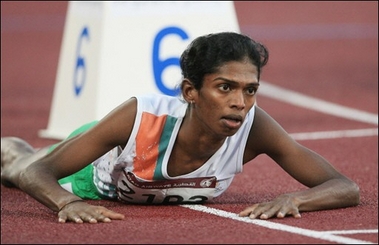Gender testing in sport
(Reuters)Updated: 2006-12-20 09:01
Indian Santhi Soundarajan was stripped of the Asian Games women's 800 metres silver medal after failing a gender test in Doha.
 Indian athlete Santhi Soundarajan has been officially stripped of her Asian Games silver medal for what the Olympic Council of Asia (OCA) said was a 'Games rule violation.' [AFP] |
Key facts about sex testing, which was introduced in 1966.
CONDUCTING TESTS
- Laboratory and genetic testing were introduced at the 1968 Mexico City Olympics.
- Women typically have two X chromosomes and men have an X and a Y chromosome in each of their cells. The presence of two X chromosomes is taken as confirmation of the athlete's female gender. Test results for about one in 500-600 athletes are abnormal.
TESTING TODAY
The International Association of Athletics Federations abandoned gender verification tests in 1991 and the International Olympic Committee (IOC) suspended the tests before the 2000 Sydney Olympics. However, the Olympic Council of Asia still conducts tests.
TRACK RECORD
- Polish sprinter Stalislawa Walasiewicz, who won the women's 100 metres at the 1932 Los Angeles Olympics, is the most notorious case. Walasiewicz changed her name to Stella Walsh and moved to the United States where she was shot dead in a robbery attempt in 1980. An autopsy showed she possessed male genitalia.
- The first athlete to fail a sex test was Polish sprinter Eva Klobukowska in 1967, who won a 4x100 relay gold at the 1964 Tokyo Olympics. She was found to have a rare condition which gave her no advantage over other athletes.
- Sisters Tamara and Irina Press won five track and field Olympic gold medals for the Soviet Union and set 26 world records in the 1960s. Their careers suddenly ended when gender testing was introduced.
- Eight athletes failed the tests at the 1996 Atlanta Olympics but were all cleared by subsequent physical examinations.
- Britain's Princess Anne, a member of the equestrian team, was excused from the gender test at the 1976 Montreal Olympics.
ARGUMENTS AGAINST GENDER TESTING
- The genetic tests provide potentially inaccurate results and discriminate against women with disorders of sexual development.
- Genetic anomalies can allow a person to have a male genetic make-up but be physiologically female. Spanish hurdler Maria Patino, who failed a gender test in 1985, was reinstated after it was found that she was resistant to the strength-promoting qualities of testosterone.
|
||
|
||
|
|